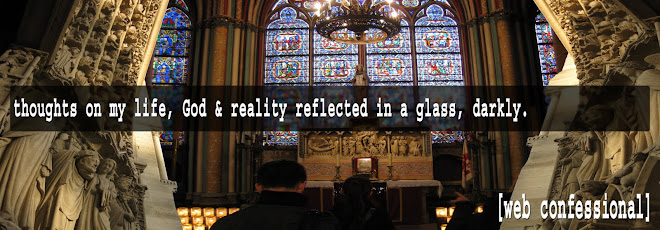we do this despite the total irrationality of it. for the rational thing would be to just have let him die in the dumpster. after all, his worth to society is about the same worth as the trash he was lying in. if pure reason informed our decision making on such matters we wouldn't use the resources of our society at keeping people like this alive. why is it that we follow reason and rationalism to the tee in all of our academic disciplines yet, in circumstances like these compassion and grace trump reason? or put another way, in circumstances like these, we might say things like "i don't care what makes the most sense, or what is the most reasonable thing to do, i'm going to do what's right." the irrationality of grace turns reason on it's head because what is rational isn't always what is right.
recently, i was thinking about the question: how is one saved? often in discussions of this topic, arguments play out like this: the bible is the objective standard of truth about salvation. thus, one must extract a set of propositions from scripture from various proof texts that logically explain how one is saved. invariably, however, there are different verses that always seem to contradict other verses, and in the end, it is impossible to come up with a perfect unquestionable formula. in my own thoughts, i was considering the story of jesus and the rich young ruler. in the story, the rich man asks jesus how one can be saved-- or enter the kingdom of God. after the rich man says he has obeyed all the laws-- which implies he believes in YHWH and takes his beliefs seriously-- jesus tells him to sell his possessions and follow him. as i rolled this story around in my head for a while and pondered other salvation proof texts i just gave up. i was getting nowhere.
perhaps salvation remains mysterious to us for one, because God saves and not us; it's not our job. but perhaps another reason is because we are saved by grace, and grace is irrational. most people have a problem with the notion of turning the other cheek. "if someone hits you, then you ought to hit them back!" we say. grace just does not make sense. it doesn't make sense to fish someone from a dumpster and spend tens of thousands of dollars on him in hospital bills after he tells you that when he leaves the hospital he will go right back to living the same way. but we do. though we think angry thoughts when we encounter these people, our society creates policies that allow this. and most of us wouldn't have it any other way.
a day after my meeting with this individual, he coded and was transferred to the ICU where he subsequently died. thankfully some of his family showed up, so at least, he didn't die alone. but this person is in God's hands now. most people, and probably most christians, would agree that this man is in hell. i get why people come to that conclusion based on scripture, but the opposite can also be said-- based on scripture. and i also have to believe that if our society can conjure up enough grace to save people most of us despise, i have to hold out hope that the God, from where grace originates, might do the same.
